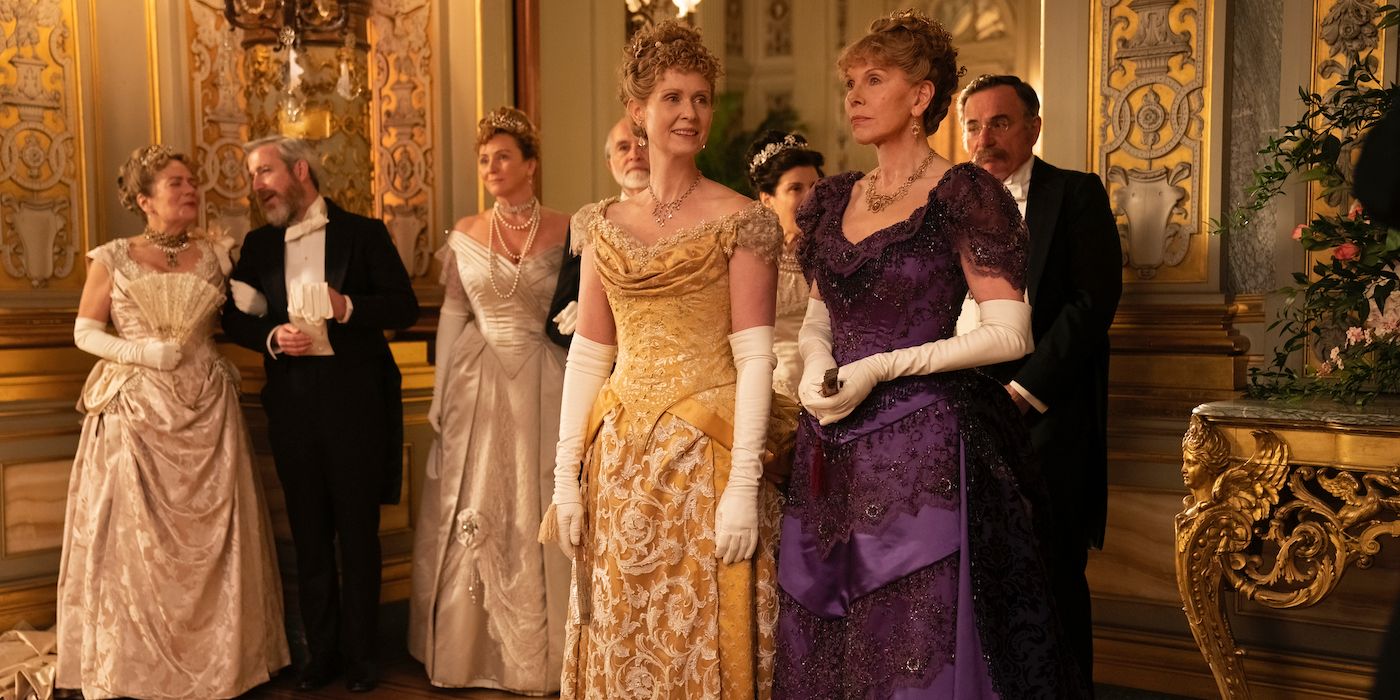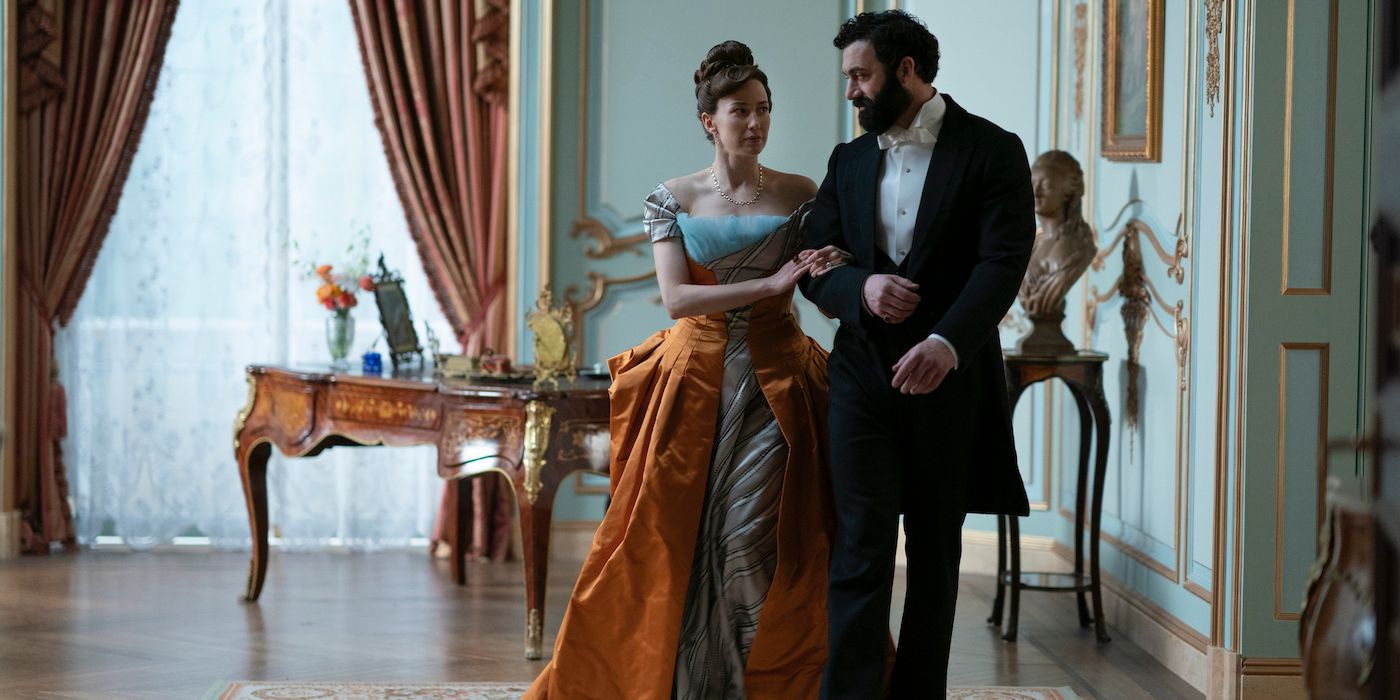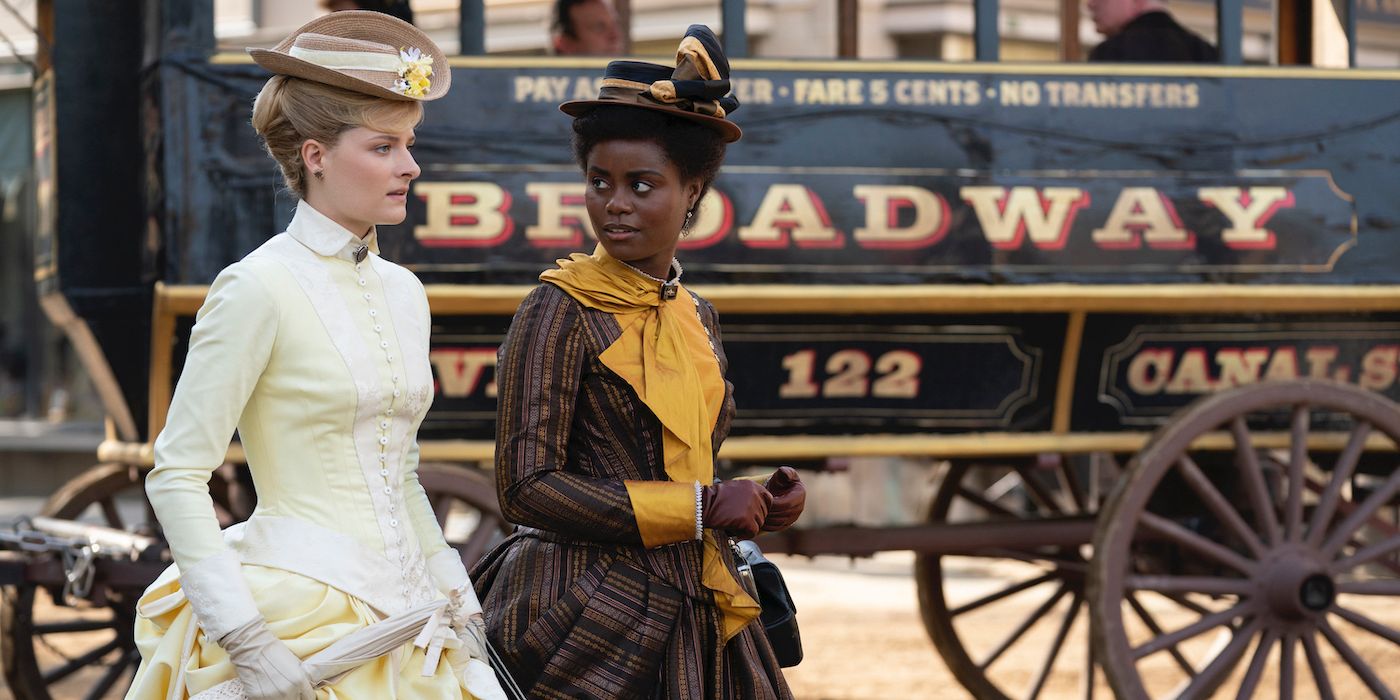Co-written by show creator Julian Fellowes (Downton Abbey) and Sonja Warfield, the HBO drama series The Gilded Age is set in the lavishly extravagant world of late 19th century New York and finds the orphaned Marian Brook (Louisa Jacobson) moving into the home of her aunts, Agnes van Rhijn (Christine Baranski) and Ada Brook (Cynthia Nixon). Once there, the young woman quickly learns the importance of whether you come from old money or new and that there are certain expectations for her that she might not be fully willing to follow, as she finds her place in society.
During a virtual junket for the new show, Fellowes spoke to Collider about how he came to be telling this very American story, balancing the lives of so many different characters, and whether they were able to accomplish everything they wanted to this season, while Warfield talked about how the two were paired up to collaborate on this together, that she feels like she’s been unknowingly preparing for this job for a long time, and how vitally important it is to humanize the Black characters in a way that isn’t often seen in period pieces.
Collider: I am having an absolute blast watching this show. It feels like one of those shows that you watch, but then you want to watch it again on mute just to look at everything.
JULIAN FELLOWES: As writers, we don’t want to be told that you don’t want to listen to it.
No, you watch it once first because you want to pay attention to the dialogue, but then you want to also see everything. You watch it multiple times because you want to see so many different things.
FELLOWES: I love that. Funnily enough, you do it with your own work. I watched Gosford Park the other day, and I haven’t seen it for about five or six years. I noticed lots of little things that I don’t think I’d ever noticed before. I love that.
SONJA WARFIELD: Being on the set was amazing too. Walking onto the set, I felt like I was in Versailles, so I know what you mean.
Julian, you’ve previously said that you have a greater knowledge of and an affection for America than any other country besides Britain. Having spent some time in the States and having lived in Los Angeles, had you always wanted to do a series about such a very American story? Is this something you’ve thought about for a long time?
FELLOWES: I think I did have a desire to tell an American story, yes. That’s from quite long ago. I’ve been coming here for coming up to 52 years. That’s more than half a century. And I lived in L.A. for a couple of years, at one point. So, I do feel very bonded with America and I did think that would be interesting. Of course, in a way, because of having an American character, one of the dollar princesses, in a series I wrote called Downton Abbey. I think that was a step towards it. I was reading around this period for quite a long time, actually, when I wasn’t thinking in terms of television, but I just thought maybe this is the American story I can tell. I was conscious of that, yes, but I was also conscious of the fact that, in the end, I’m not American. However much I’ve been here and however many American friends I’ve got, and I’ve got an American niece, I’m not American. That’s why wanted an American voice, and HBO came up with the idea of Sonja [Warfield], if she wanted to do it.
What was that like for you, Sonja? When they came to you to say that you should collaborate on this project, what was that like?
WARFIELD: Well, they didn’t say that, at first. All of a sudden, I was meeting Julian, and then they were like, “Okay, it’s a job.” I was like, “Wait, what?” I didn’t know what was happening, but I jumped at the chance. It was fantastic. I just love the characters and the world, and I’m a big Edith Wharton fan. I grew up going to the Cleveland Historical Society when I was a kid, just on my own because I liked to go. I had a very formal education at a private girls school, and we were called ladies and memorized Beowulf. It seems as if I’ve been preparing for this job for a very long time without knowing it. I also had been to Newport and loved Newport. So, when it all came about, I thought, “Well, I should do this. This is me.”
What do you think that younger version of you would think of this series and knowing that you had a hand in it?
WARFIELD: I don’t know. I was also a debutante, but I was a very reluctant debutante. I have my mother to thank for this job, honestly, because she forced me to be a debutante. In some ways, I would’ve said, “Oh, yes, this does make sense,” because I’ve been living this life and called a lady at school and studied classical literature, and all of that. But in other ways, I would’ve been like, “What am I doing?”
What are the biggest challenges for the two of you to tell a story that has so many characters and so many families? How do you approach who to focus on and when to focus on them?
FELLOWES: If you’re going to have multi-narratives and different characters, because you have settings, like you have the downstairs at the Brook house and the upstairs at the Russell house, and within those settings you have characters, the trick of it, for me, is whenever you go from this group to that group, you’ve got to not feel the audience going, “I wish we could go back to the first group.” They’ve got to always be pleased to see the people you’ve taken them to and always be interested to catch up with this line of the narrative. That’s my goal, really. I hope we’ve achieved it. You could probably tell us better than we can.
It feels brilliantly done. Is there no end to the lavish extravagance of this show? Is there anything that you feel like you weren’t able to do, or do you feel like you were able to accomplish everything you wanted to, with the season?
FELLOWES: I think we have accomplished everything we wanted. Always, when you are making a show, there’ll come a moment when someone says, “We can only get this actor for three days in July and is it okay if they’re not skiing, but they’re playing tennis,” and that will change it. To a certain extent, you have to be professional about that sort of thing. You can’t just wail and say, “It’s got to be my way.” I don’t think we’re in a position to wait for three days to get the right door, but within the concept of the fact that we have to be realistic, I think this is a very lavish show, made very generously by HBO, who haven’t held back at all. As a result, what I love about it, which is what you were saying, is that I think it really is rather gorgeous to look at. It is pleasant to the eyes to look at a really good-looking show. I love that. Of course, I grew up in a different era. All my film stars were beautiful, when I was young. They were all like Elizabeth Taylor. Everyone, even the policeman, was gorgeous. It’s a different era. But I do feel rather comfortable looking at something that’s beautiful to watch.
Sonja, what does it mean to you to have a hand in bringing in race relations at a time period like this, to bring in these Black families, and to show us characters that aren’t often seen in this kind of world?
WARFIELD: I think it’s so vitally important because it humanizes Black people in a way that we don’t see in period dramas. Mostly, period dramas focus on enslavement, or the time post-slavery, as a sharecropper. We don’t know that these people existed. If you think about Greenwood, Oklahoma and Rosewood and Black Wall Street, all of those places existed. There were Black men in state legislatures and Howard University was in existence. But those are not dramatized, for the most part, on television and film, unless it’s a documentary. I think that it’s vitally important to show that these people existed and that they were having a life. Yes, there was racism, there was sexism, there was homophobia, and all of that, but these people existed in 1882.
The Gilded Age airs on Monday nights on HBO, and is available to stream at HBO Max.



